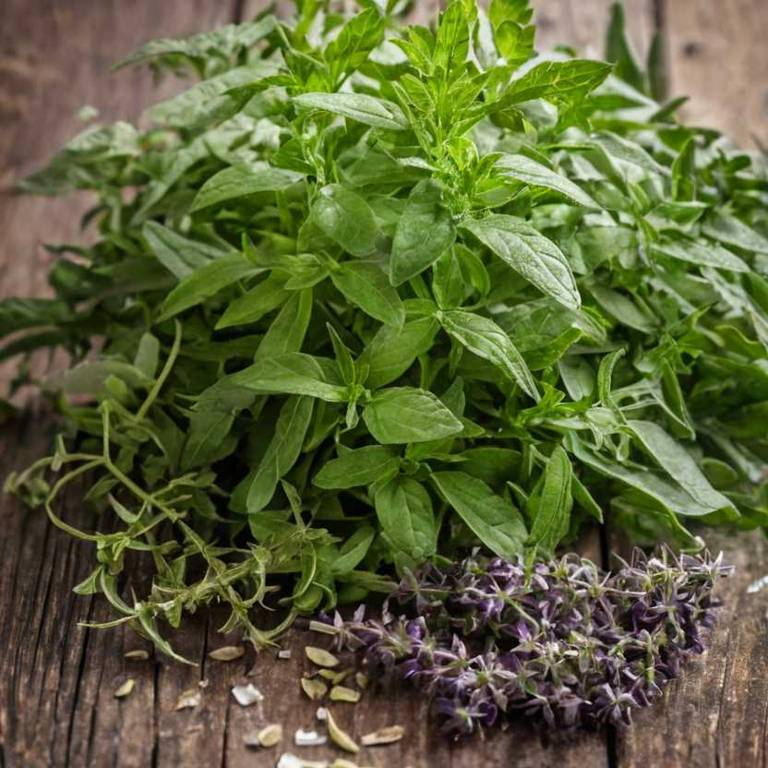Holy Basil (Ocimum tenuiflorum)
Holy Basil (Ocimum tenuiflorum) is a member of the Lamiaceae family, native to India, Southern Asia, and Eastern Africa. Traditionally, its leaves, flowers, and stems have been used for infusions, decoctions, and poultices.
This herb is particularly valued for its anti-inflammatory, tonic, and antispasmodic actions, and has a long history of use in ayurvedic medicine, traditional chinese medicine, and unani medicine.

Quick Facts / Key Information
| Common Name | Holy Basil |
|---|---|
| Scientific Name | Ocimum tenuiflorum |
| Plant Family | Lamiaceae |
| Genus | Ocimum |
| Species | tenuiflorum |
| Native Range | India, Southern Asia, Eastern Africa |
| Plant Parts Used | Leaves, Flowers, Stems |
| Primary Medicinal Actions | Anti-Inflammatory, Tonic, Antispasmodic |
| Primary Traditional Systems | Ayurvedic Medicine, Traditional Chinese Medicine, Unani Medicine |
| Historical Preparation Methods | Infusion, Decoction, Poultice |
Botanical Identity
- Scientific Name
- Ocimum tenuiflorum
- Common Name
- Holy Basil
- Synonyms / Alternative Names
- Tulsi, Sacred Basil, Ocimum Basilicum
- Plant Family
- Lamiaceae
- Genus
- Ocimum
Botanical Description
- Growth Habit
- Perennial herbaceous plant.
- Height
- It typically grows to a height of 30 to 100 centimeters.
- Leaves
- Ocimum tenuiflorum has opposite, ovate leaves with a glossy upper surface and a lighter, pubescent lower surface, featuring prominent stomatal bands along the midrib.
- Flowers
- Bilaterally symmetric flowers with four lobes, two of which are spurred, arranged in whorls of three, with white to violet petals and yellow staminodes.
- Stems
- Cylindrical, erect growth habit with opposite branching, smooth, glabrous surface, and nodes bearing leaf scars and adventitious root scars.
Traditional Uses / Historical Use
Traditional Systems
- Ayurvedic Medicine
- Traditional Chinese Medicine
Historical Preparation Methods
- Infusion
- Decoction
- Poultice
- Powder
Medicinal Actions
- Anti-inflammatory
- Commonly referenced as a mild anti-inflammatory, in tissue-soothing contexts.
- Tonic
- As described in traditional systems, a calming tonic, in general wellness contexts.
- Antispasmodic
- Traditionally described as a cooling antispasmodic, in spasm-related situations.
- Carminative
- In herbal literature, noted as a warming carminative, for digestive process support.
Active Compounds
- Essential Oil
- A collective term for aromatic compounds extracted from plant material.
- Flavonoid
- Plant-based polyphenolic compounds frequently distributed throughout aerial plant parts.
- Tannin
- A class of polyphenolic compounds commonly found in bark, leaves, and seeds.
- Phenolic Acid
- A class of aromatic plant compounds commonly found in leaves, seeds, and stems.
Modern Research Overview
Modern scientific investigation of this plant has focused on identifying its chemical constituents and examining their properties in controlled research settings. Comprehensive study summaries will be incorporated into this section as additional sources are reviewed.
Safety & Contraindications
- General Precautions
- The use of this herb may warrant general caution in certain situations.
- Contraindications
- Reports outlining specific contraindications for this herb are limited.
- Allergies
- Allergic reactions associated with this herb have not been well documented.
- Drug Interactions
- Available information regarding interactions with pharmaceutical drugs is limited.
- Toxicity
- Toxic effects associated with this herb have not been well documented.
- Pregnancy & Breastfeeding
- Use during pregnancy or breastfeeding has not been clearly established in available sources.
Preparation & Usage Methods
- Infusion
- Infusions are commonly prepared using hot water to release aromatic and soluble components.
- Decoction
- Plant parts are gently boiled in water to release soluble constituents.
- Poultice
- Poultices involve external application of prepared plant matter.
- Powder
- Dried plant material is ground into a fine powder.
- Capsule
- Powdered plant material is enclosed in a capsule for oral consumption.
Growing, Harvesting & Storage
Growing / Cultivation
- Soil
- Prefers loamy soil with well-drained conditions. Typically grows best in organically rich soils.
- Sunlight
- Thrives in full sun. Tolerates full sun to partial shade.
- Watering
- Prefers well-balanced moisture levels. Tolerates periodic dry conditions.
Medical Disclaimer
The information provided on this page is for educational and informational purposes only. It is not intended to diagnose, treat, cure, or prevent any medical condition. Always consult a qualified healthcare professional before using any herb for medicinal purposes.